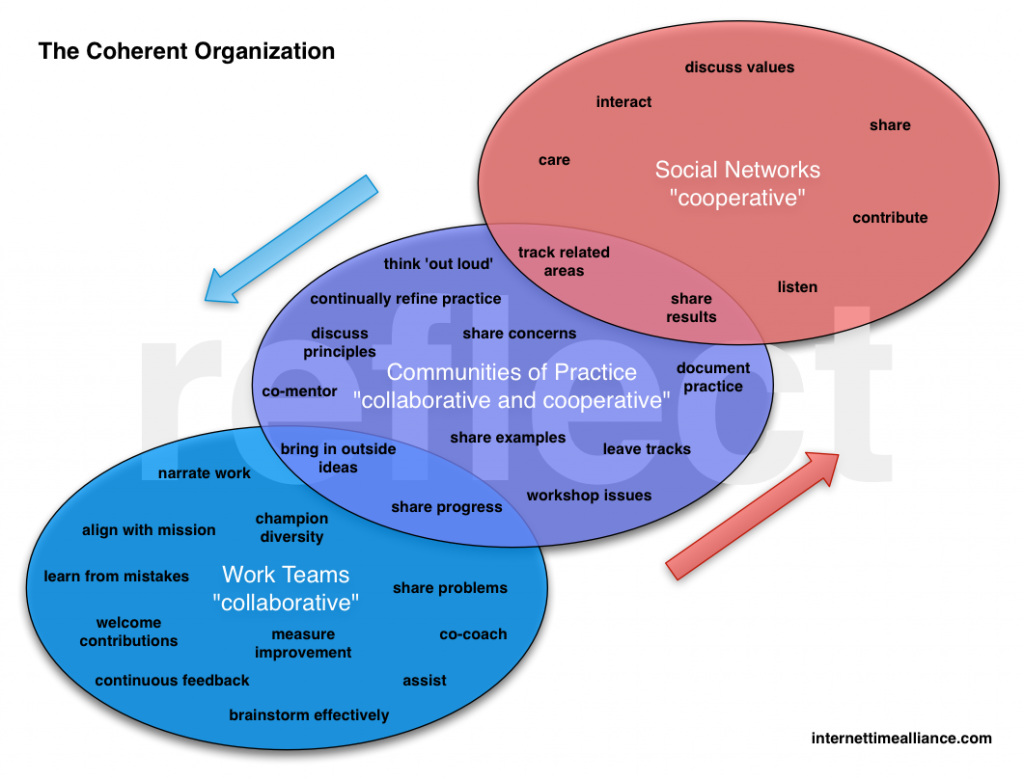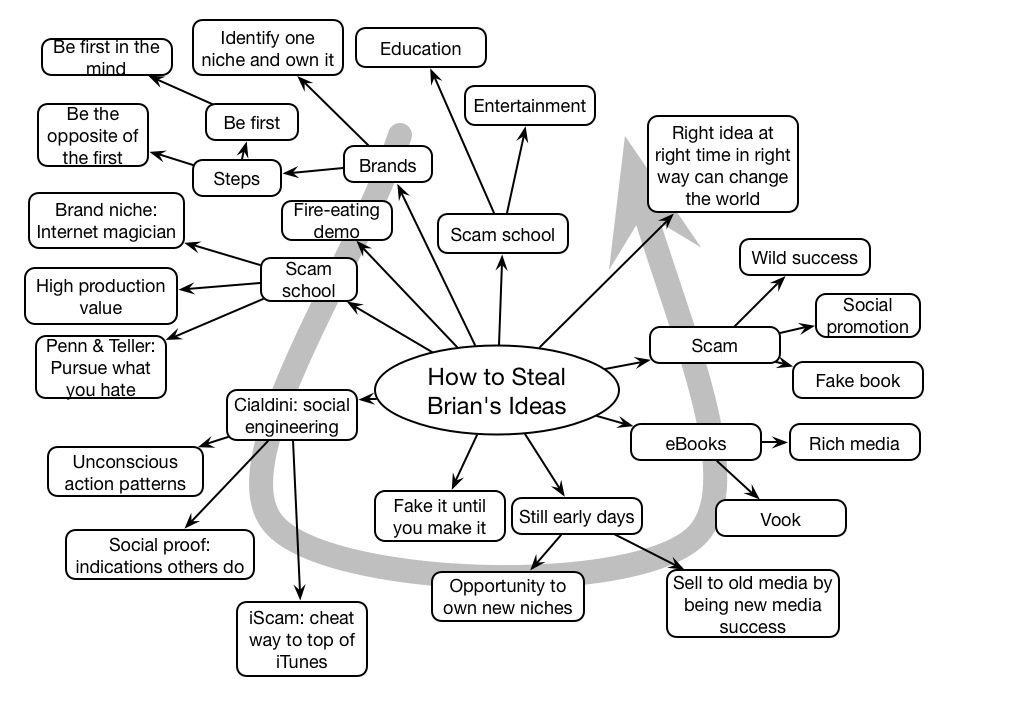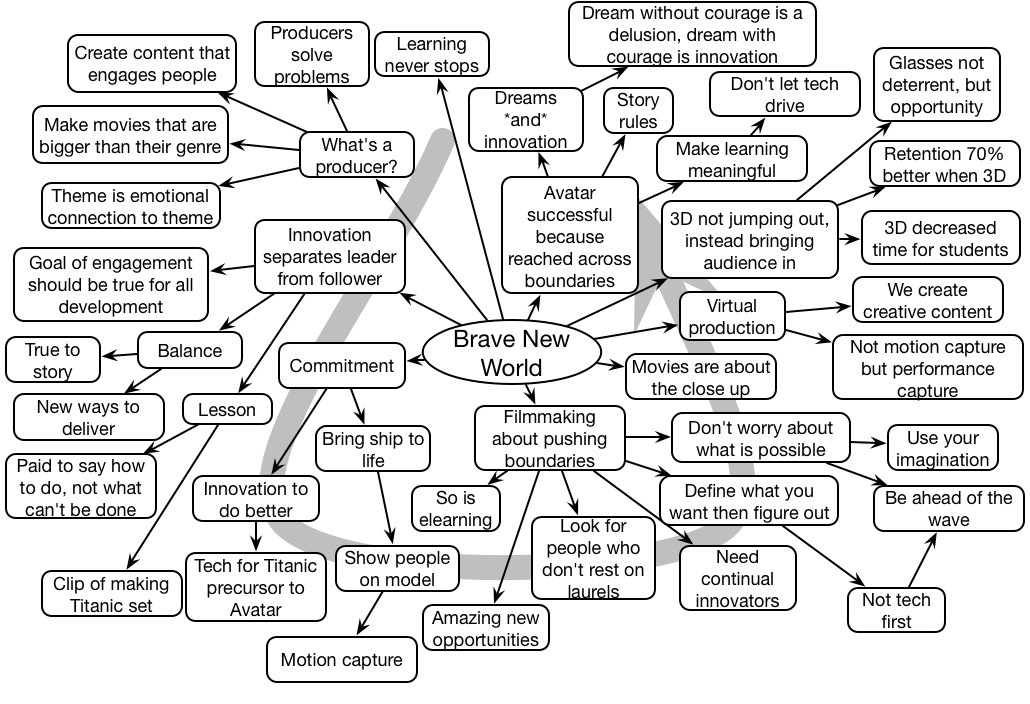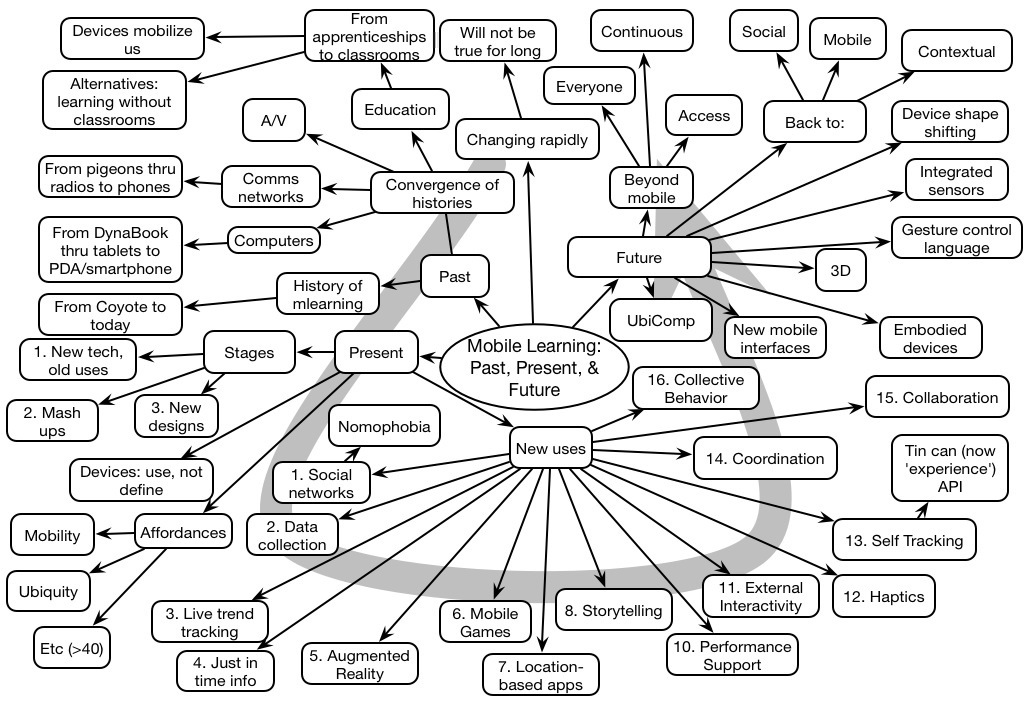Brian Brushwood riffed off his success with Scam School and other scams to provide lessons about branding and new media opportunity.
Archives for October 2012
Jon Landau #DevLearn Keynote Mindmap
Interviewed about mobile
Denise VanderLinde, a student from Florida Gulf Coast University, interviewed me on mobile. Here’s the (largely unedited) transcript she provided for me:
- What is your definition of mobile learning? Using a mobile device to make us more effective, either in the moment or developing us over time. A mobile device is a small portable device that is with us all the time and we are doing something with it because of where we are.
- Would you consider a laptop a Mobile Device? A laptop is not normally considered a mobile device and this topic has been discussed and argued at length, in fact, amongst industry leaders who concur that they are essentially ‘mobile desk tops‘. ‘Pocket-able devices‘ such as tablets and phones are considered mobile devices generally. Phones are usually used to access some information quickly and then it is put away and iPad or other tablet can be used for content creation and can be used for more long-term usage.
- Can you tell me about your success story of using mobile technology for learning (or training, or performance improvement)? My company doesn‘t create solutions so much as helping people come up with the strategies to do it. When I was designing solutions, though, a cell phone technology provider approached us to supplement a face to face training course on negotiation to be delivered via the phone. I designed a solution that incorporated (amongst other things) a quiz with 19 elements that were deemed important subject matter that trainees should know cold, 10 little mini scenarios trainees might be subject to, performance support for 16 stages of negotiation and the questions trainees should be asking themselves at each stage.
- What important development trends do you see coming down the pike in mobile learning? Context sensitive; we have the capability now but we‘re not taking advantage of it yet. The opportunity to know where people are (GPS chip) and what they are doing via their mobile calendars. That way we can tailor what we pull or push to/from individuals based on their locations and what sorts of meetings they attend and on what subjects etc. to meet individual‘s needs better.
- What important problems do you think still need to be resolved in mobile learning?
- Cross Platform issue/ lack of standards – html 5 not standard yet but if it were would be great but there will be, of course, resistance by software companies like Apple, Google, Microsoft etc.
- I would love to see productivity tools available to enable users to design/write their own apps that meet their needs better.
- Thinking that M-learning is just ‘courses on a phone‘ is a change that we‘ve got to make. It‘s much more than that. It‘s about the 4 C‘s: Content, Communicate, Capture and Compute.
- Does your firm work predominantly with corporations or do you also work with teachers, schools and/or school boards in improving educational technology use in the classroom setting? I haven‘t done much mobile K-12 but have done some higher education mobile work but most work in mobile has been corporate. People have their mobile device with them all the time so it‘s a great way to distribute knowledge to the world, not just one head.
- Do you find corporate and/or school staff still seem reluctant to use technology or do you see that trend shifting in more recent years? I haven‘t experienced much resistance unless people are asked to use their personal device that they pay for themselves. That is not going over so well but, overall, if you have the right culture, there hasn‘t been much resistance.
- Is there anything else at all that you would like to share at this time regarding mobile technology? The one that starts going hand in hand with mobile is to begin to think in a deeper way about Content Systems, about Content Modeling and Content Architectures. It‘s going to support mobile initially and that personalization going forward. I wrote an article on this topic and another is coming out soon in Learning Solutions Magazine.
Gary Woodill #mobilearnasia Keynote Mindmap
Gary Woodill gave a broad reaching keynote covering the past, present, and future of mobile learning. Peppered with great examples and good thinking, it was an illuminating kickoff to the MobiLearnAsia conference.
Learning There
A respected colleague recently suggested Andy Clark’s Being There as a read to characterize the new views of cognition, so I checked it out. The book covers the new emerging views of cognition, grounded in the connectionist revolution and incorporating a wide variety of neural and robotic studies. The interesting thing to me are the implications for learning and instruction.
The book makes the case that the way we think is not only heavily tied to our contexts, but that we co-construct the world in ways that affect our thinking in profound ways. Studies across economic behavior, animal cognition, simulation studies, and more are integrated to make the point that they way we think is very different than the models of conscious minds sitting in meat vehicles. Instead, we’re very driven from below and outside, and our conscious thinking is rare, hard, and language based. Moreover, the constructs we create to think affect our thinking, making it easier. We automate much not only through learning, but we externalize. And, our representations and understanding are very much constructed ‘on the fly’ in each new situations, as opposed to existing abstract and robust.
This isn’t easy reading. Clark is a philosopher of mind, and covers much complex research and deep neuroscience. The emergent picture, however, is of a mind very different than the cognitivist model. I’m grateful that while I pursued my PhD in Cog Psych, the research going on in our co-shared lab by Rumelhart and McClelland on connectionist networks sensitized me to this viewpoint, and Hutchins work on Cognition in the Wild was similarly taking place at the same time. Despite the challenge, there are important reasons to get our minds around this way of thinking.
The notion that providing abstract knowledge will lead to any meaningful outcome has already pretty much been debunked both empirically and theoretically. What these models seem to suggest is that what can and will work is deep scaffolded practice and guided reflection, based upon a situated cognition. For other reasons, this is the model that Collins and Brown had in Cognitive Apprenticeship, and now we’ve a more solid philosophical basis for it. (I also think that there are rejoinders to Kirschner, Sweller, & Clark, and Anderson, Reder, & Simon; discussing how language, including writing, is social, and that iterations between abstract models and meaningful practice is guided reflection.)
This model suggests that language is our differentiator, and that much of our higher level cognition is mediated through language. There’s a reason consciousness feels like a dialog. Much of our processing is beneath consciousness, and things we monitor and develop through language become compiled away inaccessible to language.
The point, to me, is that the activity-based learning model I’ve proposed has both bottom up grounding in new cognitive models, theoretical framing from anchored instruction and social constructivism, as well as empirical validity from apprenticeships and work-place learning. We need to start aligning our learning design to the cognitive realities.
Push the envelope further
When I run my game design workshop, one of the things I advocate is exaggeration. And you need to take this to heart in two ways: one is why it’s important, and the other is how to get away with it. That is, if you want learning to be as effective as possible.
When individuals perform in the real world, they’re motivated. There are consequences for failure, and rewards (tangible or not) for success. Yet in the learning experience, if we try to make it as real as possible, those motivations aren’t likely to be there. We want it to be safe to fail, so there aren’t quite the same consequences. How do we make it closer to the real context, to maximize transfer? Exaggerate the circumstances:
- You’re not working on a patient, you’re working to save the ambassador’s daughter
- You’re not just making a deal, you’re making the deal that the business is going to need to keep from going into receivership
- You’re not just designing a networking solution, you’re designing one to support the communications for the rebels overthrowing the oppressive regime
You get the idea. You have to avoid stereotypes, and it’s a delicate dance to make it something that the learners will not dismiss but buy as more interesting than if you played it straight. Still, it’s worth the effort. And testing’s a good idea ;).
You want these exaggerations not just for task-based motivation, but you also want to make it more meaningful to the learner. Tap into not only the right application of the decision in context, but also a context learners will care about.
How do you get away with this? You know that you’re going to get reined in, stakeholders are always so precious about their content (“you can’t be flip about X!”). So go further than you think you’ll get away with. You’ll get reined in, but then you’ll still end up at a reasonable place.
For example, we were doing a learning experience about using web tools, and learners were going to create a web site. If you want youth to do it, we could’ve gone in different directions: a site for some environmental need, or for a subversive organization. In this case, we decided it would be plausible (larger context was a design agency) to do a client band.
If we’d said rock band, we’d be reined back to a pop band. Instead, we chose Goth Polka (and were surprised to find that it exists), and had a band name of the Death Kloggerz (in appropriate font). The client reined us in, because Death was too far for them to countenance, so we ended up with the Dark Kloggerz. Still, we got to keep in the odd elements that we felt were appropriate to keep it from being too banal.
The stakeholders will rein you in, but fight for the extreme. Your learners will thank you.
Living on the road
I’ve spent a few days on the road the past few weeks, and thought I’d share my reflections on trying to survive sensibly and healthily. Kinda out of the normal line, but FWIW:
1) if you stay in a hotel that’s crazy enough to provide dinner, but also has kitchens, use the kitchens. Tried the fried rice yesterday and it was too salty. The overly sauced sesame chicken looked like it had death levels of sugar. And the fried egg rolls? Fat levels better left unmentioned. Glad I picked up food at TJ’s. Even if I have to wash the dishes (soap bars seem to work ;), it’s better than this food for a week. Today was better, the veggies looked ok, but the garlic bread looked suss and bet the chicken parmiagano was way too salty too.
2) same lesson for breakfast. The sausage and cheesy potatoes were ok yesterday, but glad I found the oatmeal today. I love biscuits and gravy, but they’d be the death of me if I ate the buffet bins everyday. Hard enough to eat well on the road.
3) increasingly, I’m finding tasty meal-scope salads when you inevitably eat out that I can really fill up on and feel good about eating: yesterday, asked for grilled chicken instead of fried on my southwest salad, today got the peanut sauce on the side for the oriental salad. Increasingly avoiding carbs, going for veggies and bits of meat.
As you get older, are on the road a fair bit, and still want to enjoy life, you need to find ways to eat more healthy when out and about. The good news is, it’s increasingly doable, but it also means some diligence. It’s hard to rein in my enthusiasm for food, but the realities of the slowing metabolism (I hate that) despite exercise mean I’ve got to find ways…
Love hearing your strategies!
Wise organizations
My ITA colleague Jay (always a spark igniter) has been thinking about well-being in organizations, and it activated my thinking on wisdom. My interest in wisdom continues to ferment, slowly but surely, as a personal commitment. My question was what would business wisdom look like, and what would be the benefits?
One preliminary issue is definitional: when I google the term, I mostly see good business practices wrapped up and trumped as business wisdom. That’s not quite what I mean. We’ve seen examples of people doing things that were smart in the moment, but not very smart over time (*cough* Enron *cough*). Yes, there are some business principles that really do stand the test of time and could be considered business wisdom, but I’m thinking more about wise decisions, not wise principles. Other folks tend to treat wisdom as ineffable or only obvious in situ, you know it when you see it but you can’t analyze it. That doesn’t leave me much traction, so I focus on frameworks that give me some possibility for doing things differently.
So the definition I like for wisdom comes from Robert Sternberg, where he talks about making decisions that are not just smart in the short term, but in the long term. Decisions that consider not just me and mine, but society in general. And decisions that are based on values that are articulated and examined, not implicit and potentially less then optimal. I suggest that this sort of approach would lead to better decisions.
One of the things would be just to get people to start making decisions with this approach. If you accept the view that for situations where we’re experts, we can trust our gut, this means more to slow down when we’re making decisions out of our comfort zone. It’s harder work, to be very conscious in our decision making process, but I hope it’s implicitly obvious that making better decisions is the best solution.
And this segues into the broader topic of the organizational culture. I’m not immune to the view that there’s a certain personal attitude to wisdom. The wisest people I know are also the most unflappable, thoughtful and warm. And I think that’s hard to accomplish in an organization where everything you say can and will be held against you. You’ve got to have the appropriate culture for such an approach to flourish. Which ties to Jay’s interest in well-being, bring me full circle.
So, I think there’s an argument to be made for consider wisdom in business, as part of a longer term shift from short term returns to a sustainable differentiator. Coupled with appropriation of collaboration and cooperation, I suggest organizations can and should be working wiser and more coherently.
Inoculating the organization
I was having a discussion the other day with my ITA colleague Jay Cross, and the topic wandered over to how to use the social approaches we foster under the umbrella of the Coherent Organization to help organizations become one. And I went feral.
 Do we work top down, or bottom up? In the course of the conversation it occurred to me that given the model we propose, that you can’t just have the broader social network create it, and you can’t even really build a community of practice (CoP). The smallest unit is the working group; how could we use that?
Do we work top down, or bottom up? In the course of the conversation it occurred to me that given the model we propose, that you can’t just have the broader social network create it, and you can’t even really build a community of practice (CoP). The smallest unit is the working group; how could we use that?
The thought that struck me was creating a working group who’s goal was to create a CoP around being a Coherent Organization. That is, they’d have to understand the principles, start defining and discussing it, document the opportunities, and start disseminating the ideas through the organization. Inherently, it has to be viral, and the most effective way to introduce a virus is by inoculation.
The idea then is that the mission of the working group is to develop a community of practice around understanding and implementing developing communities of practice. It’s a bit recursive or self-referential, but it’s the seed that needs to sprout. Seeding it is the action that’s needed to get it going, and then some feeding needs to happen. While it’s possible that a self-supported initiative could survive, having some external support may make sense in making this happen.
Yes, I’m assuming that the end result is desirable and possible. The former is, I think, reasonably well accepted (short form: working effectively is a necessary survival tactic, going forward), even if the path to get there isn’t. I’m suggesting that this is a path to get there. It’s not easy; it takes persistence, support, all those things that make organizational initiatives succeed, with an understanding of the strategies, policies, and cultural adjustments needed. Yet I’ll suggest that it is doable. Now, it’s time to do it!
#itashare
Focus on ‘do’
I’ve been working on a project where we’re reviewing the curriculum before we design the learning outcome. The level of detail is admirable: courses are defined by objectives, which then drive learning objectives, from which are extracted key concepts to present. And I’m finding one approach that’s making this go really well.
There are problems with the existing content. Some of the learning objectives are too specific, leading to an interpretation that won’t lead to transfer beyond the classroom. Some of the coverage in objectives or concepts is biased, so some topics are not covered enough, and others too much. Some of the learning objectives are focused on tasks that were clearly designed to incite learner interest, but not in an intrinsic way. And I’m not a domain expert, but I can still apply enough real world knowledge to make this determination (and we’ll review with SMEs).
What’s providing a very useful lever in identifying these gaps, even prior to remedying them, is a rabid focus on ‘do‘. That is: “what will the learner be able to do with this after the class”. Implied are two things: 1) that the learner will care about , and 2) that will let them have an impact somewhere.
This focus is letting me see that some things are so specific that they won’t generalize anywhere interesting; to identify that some of the goals are not really relevant anywhere else (e.g. a focus on ‘celebrity’ examples). That the coverage is spotty and some topics that have applicability have been skipped.
Such a focus will, I think, help in the discussions with the SMEs, and provide a way to work with them to get good outcomes for the learning and the learners. It’s a learning-centered approach (I think that’s a better phrase than learner-centric) that helps us meet the client’s goals in ways they understand.
What do you think?


